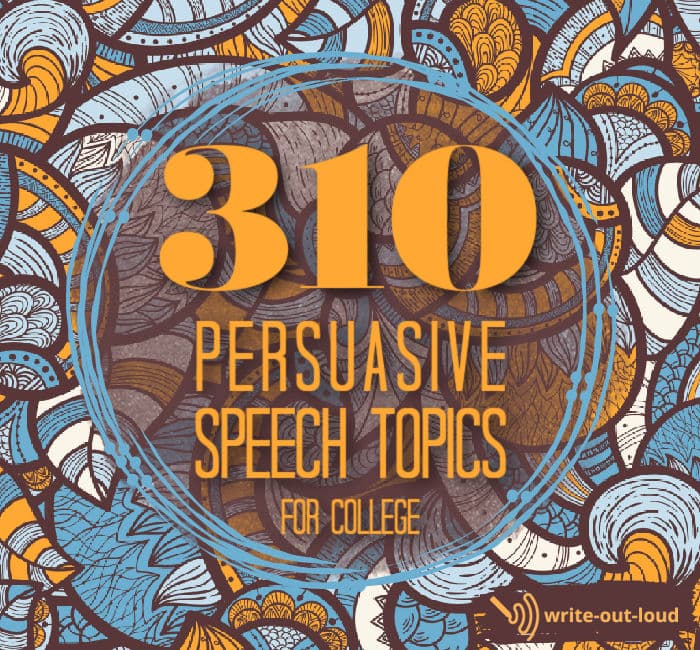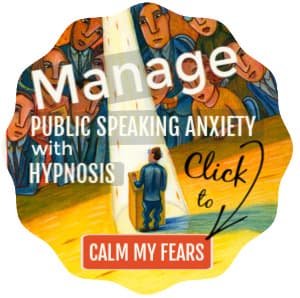- HOME ›
- Writing a persuasive speech ›
- persuasive speech topics for college
310 persuasive speech topics for college
60 education topics, 50 mental health...
By: Susan Dugdale
Can you engage, inform, and persuade? Can you do all three at once?
That’s what a good persuasive speech does. It challenges an audience’s thinking or position on a topic or an issue, asks them to pause, and consider changing their minds.
There are 310 great persuasive speech topics for college students and/or their teachers here.
- 50 Mental health persuasive speech topics
- 60 Education persuasive speech ideas
- 50 Family themed persuasive speech topics
- 50 Friends persuasive speech topic suggestions
- 50 Animals/Pets themed persuasive topics
- 50 Society persuasive topic ideas
Plus, how to prepare a speech for a set time allowance and more about choosing a good topic and writing a great persuasive speech.

Each of them could make an excellent speech. Whether any of them do, or not, depends on a number of factors. The two main ones are you, and your audience.
What makes a persuasive speech topic good or interesting? (A very quick overview)
A subject is right for you if:
- it is about something you are genuinely interested in or passionate about, and
- it is something you know your audience will relate to and it would be interesting, or beneficial, for them to know about.
50 mental health persuasive speech topics

- that academic pressure causes anxiety and depression in college students
- that increased use of social media heightens anxiety about physical appearance
- that poverty and homelessness are often root causes of poor mental health
- that addictive behaviors are not a sign of poor character
- that binge drinking can mask depression
- that typical adolescent angst and teenage depression are not the same
- that self-harming is a cry for help
- that living in green cities improves mental health
- that seeking out positive news stories makes a difference
- that limiting the consumption of unfiltered social media helps mental well being
- that learning to objectively scale experiences helps keep them in perspective
- that understanding family patterns of behaviour is useful for understanding ourselves
- that being mentally unwell is not proof of incurable insanity
- that building resilience will guard against becoming mentally unwell
- that depression and anxiety, like flu, can be contagious
- that mental health is improved by some form of consistent exercise
- that everybody needs people who love and understand them
- that doing kind things for other people improves mental health
- that monitoring and changing how we habitually talk to ourselves can improve personal mental health
- that forgiving ourselves, in the same way we would a friend, for minor transgressions is healthy
- that loneliness contributes to mental health issues
- that genetic inheritance influences our mental health
- that eating healthily improves mental health
- that chronic bullying is a sign of poor mental health
- that the desire to fit in, to be the same as everyone else, is a sign of insecurity
- that mental strength is built by being eager to learn new things
- that mental strength is built by accepting responsibility for our thoughts and actions
- that mental strength is built by being willing to make mistakes and to be OK about that
- that mental strength is built by learning not to measure self-worth by comparing ourselves to others and by being OK about who we are
- that mental strength is built through being genuinely pleased for the success of others
- that we protect our mental health by knowing when and how to withdraw from situations and people that are not good for us
- that good mental health is supported by managing our own expectations of ourselves realistically
- that good mental health is something that has to be worked on everyday
- that good mental health requires us knowing our own strengths and weaknesses
- that there is not a ‘one size fits all’ model for good mental health because we are individuals
- that we have more mental health issues today, because we are more willing to openly discuss them than previous generations
- that asking for help when you know you need it is a sign of good mental health
- that learning to be happily alone is good for mental health
- that learning to set challenging realistic goals and working towards achieving them helps to build and sustain good mental health
- that being genuinely grateful for the good in our lives helps sustain robust mental health
- that re-framing problems as challenges or opportunities helps develop mental resilience
- that keeping a journal promotes good mental health
- that children need appropriate guidance and discipline to develop good mental health
- that the foundation for good mental health in adults is built in childhood
- that our primary influencers (parents, family, teachers, friends...) shape our mental health
- that mental and physical health are inseparable
- that mental health issues in children are not necessarily their parents fault
- that mental health in many sectors of our communities has been severely tested by the pandemic
- that mental health issues highlighted by the pandemic have forced us to think more creatively about how we meet them
- that we are often stronger mentally than we think we are
60 education persuasive speech topics

- that education should be free and freely available to whomever wants it
- that education systems should be free of bias
- that all children should have equal educational opportunities
- that any form of educational segregation (gender, racial, economic, religious...) should be unlawful
- that education is power
- that the control of a country’s education system should not be in the hands of politicians or a political party
- that a vocational education is more useful
- that the principal role of education is to teach individuals to be stable, strong members of society
- that a good education is one that teaches a person to take responsibility for themselves financially
- that there is no time in our lives when we are finished being educated
- that schools squash creativity and initiative
- that going to school and being educated are two different things
- that we learn more outside of a classroom than inside it
- that lack of formal education is the cause of societal unrest
- that our current school systems only really work for children from stable backgrounds
- that one good caring teacher can make all the difference
- that a teacher has the potential to influence their students’ lives enormously
- that being a teacher is a privileged position
- that teachers should be acknowledged and highly valued
- that the criteria for entering teacher training should be more discriminating
- that teacher training should be longer and more rigorous
- that teachers should be tested every five years in order to renew their license to teach
- that practical education is better than theoretical
- that the school leaving age should not be raised
- that the most important lessons at school happen in the playground
- that enrolling a child in any form of educational institution should be optional
- that parents should have the right to decide what classes their child attends
- that homeschooling does not hinder a child in any way
- that homeschooling is better for a child’s mental health
- that homeschooling is an option only economically advantaged parents can offer their children
- that parents who decide to homeschool their children need to feel OK about spending large chunks of time with them
- that psychological screening should be used to decide what school a student goes to
- that our grading systems fail to motivate students who struggle
- that separating a grade given for a piece of schoolwork from one’s self-esteem, or person, is difficult
- that grading is a frequently misunderstood, misapplied, inexact science
- that face to face real time learning is more effective than online learning
- that streaming (grouping students in classes according to their intellectual ability) should be banned
- that the principal function of education is to teach people to think rationally and creatively
- that failing at school is never the fault of the student
- that accelerate classes are elitist
- that the drive to get more students into higher education is misplaced
- that school uniforms should be compulsory
- that all children should have access to extra tuition as it is needed
- that an education system based on grades and examinations only benefits a small percentage of the children it is supposed to serve
- that online learning centers like the Kahn Academy democratize education
- that teachers should receive financial rewards based on the success of their students
- that financial literacy should be given similar teaching time as reading and writing
- that socio-economic factors indicate the likelihood of future educational success
- that intellectual ability develops best in a safe secure stress-free environment
- that girls perform better academically in all girl schools
- that single-sex schooling slows the growth of appropriate social skills
- that children less than 10 years old should not given graded tests and ranked according to their scores
- that active community service should be part a school’s curriculum
- that meditation techniques should be taught in all schools
- that homework teaches time management and self discipline
- that developing imagination and creativity is equally important as developing stable work habits and good numeracy and literacy skills
- that smaller class sizes make it more likely a student will thrive
- that entrepreneurial skills should be encouraged and taught in schools
- that all high school students should be assigned or have access to a mentor
- that weapons of any sort should be banned from school campuses
50 family themed persuasive speech topics

- that what makes a person a valued family member is not necessarily a blood tie
- that being one of many children in a family is an advantage
- that being part of a close multi-generational family has advantages for everyone
- that only children have more expected of them than children who have siblings
- that the eldest child in a family carries more responsibility than their siblings
- that the youngest child in the family is the most spoilt
- that the middle child in a family has the least favoured position
- that the order of the birth of siblings has a major impact on their psychological development
- that older parents are better equipped financially and emotionally to parent well
- that consciously choosing to have a child makes a positive difference to how a child is parented
- that it is better to be a loved child in a poor family than an unloved child in a wealthy one
- that parents should not compare their children
- that children should obey their parents
- that a child should not have everything they ask for
- that children should have regular age-appropriate household tasks to do
- that children have a right to privacy
- that children need to know they are loved and supported no matter what happens
- that parents should not bicker or fight in front of children
- that a child should never be disciplined by hitting
- that a parent needs to behave like a parent, not a friend, or a child
- that parental favouritism damages children
- that boys and girls should be treated equally
- that parents should attend classes on parenting before being permitted to have a child
- that babies and small children are better off at home with their mothers
- that designer children should be illegal
- that a woman should have the right to terminate a pregnancy
- that being a dad is not the same as being a father
- that parents divorcing causes significant issues for their children
- that home should always be a safe place
- that parents are responsible for how their children behave
- that a child will follow the pattern set by the adults around them
- that a teenage mother should be fully supported to look after her child and develop herself
- that taking a child into custody should be the very last resort
- that divorced parents should always talk respectfully about each other in front of their children
- that combining families when parents remarry should be handled with great care
- that children should never witness their parents fighting over them
- that children should never be played off against each other
- that parents set behavioral boundaries to keep their children safe
- that publicly shaming a child is cruel
- that parents do not always know best
- that a child has the right to expect that their parents take good care of them
- that children are never better than each other only different
- that the demands of family life and work need to be better balanced
- that children should not be made to kiss or hug people they do not want to
- that parents should make time to talk with and listened to their children
- that becoming an adopted relative: grandparent, aunt or uncle is a great way to enrich a child’s life
- that solo parents need non-judgmental practical support to help raise their children
- that baby sitters need to be old enough to be responsible as well as known to children before they are left with them
- that there is no such thing as a bad child
- that a bullied child needs compassionate support and understanding
50 persuasive speech topic ideas about friends

- that we all need a little help from our friends
- that everybody needs at least one best friend
- that a person’s life is influenced by childhood friends
- that we are defined by those who we are friends with
- that “liking” media posts is a form of friendship
- that a true friend is someone who knows your fears, vulnerabilities and weaknesses and loves you just the same
- that a friend is someone you know you can depend on
- that the most important relationship a person will ever have is an enduring friendship
- that true friendship transcends boundaries and overcomes obstacles
- that we need to be taught how to sustain healthy friendships
- that a friend helps a person keep themselves in check
- that a friend is someone we will accept the truth from
- that a real friend is not possessive about you
- that in a real friendship the amount of giving and taking are balanced
- that a real friend encourages the best in you, not the worst
- that mutual trust is the foundation of a good friendship
- that a friend is someone who has your best interests at heart
- that a friend does not gossip cruelly behind your back
- that a friend is someone you enjoy being with
- that a friend is someone who doesn’t make you feel anxious about saying or doing the wrong thing
- that boys are better at being friends than girls are
- that making new friends as we get older is harder
- that being a loyal friend does not mean agreeing with everything a friend says or does
- that getting help to break away from toxic friendships is a healthy thing to do
- that listening is vitally important in a friendship
- that a true friend will prioritize and rearrange their schedule in order to be with you
- that we need a variety of different types of people as good friends
- that to be a good friend we need to respect boundaries and beliefs
- that we can disagree with a friend and remain friends
- that being a friend does not mean accepting poor behavior towards yourself or others you care about
- that we achieve and become our best selves through the support and love of friends
- that learning to be a good friend is an essential life skill
- that friendships can come and go and that’s OK
- that a good friend will never publicly humiliate you
- that behaving in certain ways in order to attract or impress friends will not really work
- that a friend is someone who likes you for who you are, not for what you have, look like or do
- that apologizing sincerely for your part in a misunderstanding or falling out between friends is essential for the friendship to survive
- that learning to leave a friendship with grace when it no longer works is a valuable skill to have
- that men often have mates but few friends
- that our mental health improves when we have loving caring friends
- that a real friend is someone you can be away from for years and then resume a deep connection very quickly
- that there are degrees, and different types, of friendship and all of them are valuable
- that there can be no such thing as a platonic friendship between a man and a woman
- that having an imaginary friend as a small child is normal
- that a true friendship between an older person and a child is something to be encouraged
- that building genuine friendships with open hearts and minds breaks down prejudice
- that parents should intervene in their children’s friendships if they see them making poor choices or compromising themselves
- that there is a fine line between discussing a friend’s problems because you are concerned about them and discussing them because you find them amusing or good for shock value
- that comparison and competition between friends is inevitable
- that friendship is one of life’s essentials
50 society themed persuasive speech ideas

- that to fit into the society you live in you must conform
- that society does not tolerate difference
- that society reflects the attitudes of the people who live in it
- that we can not live outside society
- that the influence of society is totally pervasive
- that change is the enemy of society
- that in a capitalist society there will always be winners and losers
- that there is no such thing as an ideal society
- that social and economic inequality will force change in society
- that ruling a society through fear and/or force will never create stability
- that a society that maintains a rigid class structure is bound to fail
- that those in charge of society should act in the interests of all its members
- that the problems a society faces are of its own making
- that the controls a society puts in place are for the benefit of its members
- that there will always be some people who have, and some people who do not
- that the most damaging rules of a society are its unwritten ones
- that virtual society is replacing older forms of society
- that the knowledge society is breaking down barriers
- that western society is losing its influence
- that high society sustains itself by living off the efforts of those below it
- that modern society is neither better or worse, just different
- that an equal society is a worthy aspiration
- that a progressive society absorbs change for the good of its members
- that crime is a threat to society
- that how a society treats its most vulnerable members is a measure of how much it cares
- that a wealthy society is built on much more than money
- that a self-made man or woman will always be a hero in a capitalist society
- that if corporations paid their fair share of taxes, our societies would benefit hugely
- that compulsory citizenship classes would make us better members of society
- that a healthy society values the contributions of its members equally
- that a civilized society is a fiction
- that the role of education is to enable people to take their places productively in society
- that the rules of a society are made by the most powerful to keep the weak in their place
- that, in theory, a socialist society is classless
- that communism and socialism are not the same thing
- that a democratic society is protected by every adult who is eligible to vote doing so
- that what makes a member of society good depends on the society you belong to
- that a society that can not tolerate criticism is inherently weak
- that the members of a society often use social sanctions to keep in each other in line
- than an authoritarian society rules through fear
- that constant oppression will eventually cause an uprising of people looking to change the society they live in
- that those who lead societies need to be fully aware of the enormous responsibilities they carry on behalf of the people they serve
- that modern media escalates the problems we have in society
- that changes in what society considers to be moral, and normal, sexual behavior is inevitable
- that we do not immediately go straight to hell if we challenge society’s traditionally held views on abortion
- that a society that has to imprison or kill its dissenting members in order to keep control is immoral
- that society provides form and meaning in our lives
- that living in society’s rat race is inescapable
- that changes in any society only come about through the willingness of some its members to speak out and act
- that true heroes are people who know the potential risks of challenging those in power in the societies in which they live and do it anyway
50 persuasive speech topics about animals

- that pet euthanasia is humane
- that feeding naturally carnivorous animals a vegetarian diet is wrong
- that giving a pet to a child to care for teaches responsibility
- that dogs resemble their owners
- that battery farming should be banned for health reasons
- that battery farming should be banned for ethical reasons
- that keeping dangerous animals as pets should be banned
- that zoos should be regularly audited to ensure they are meeting the needs of the animals they house
- that hunting animals for sport is wrong
- that anthropomorphizing animals is foolhardy
- that taking an animal or bird from its natural habitat is cruel
- that animal or bird breeding programs set up for monetary gain are wrong
- that keeping a large four-legged pet in an apartment is wrong
- that people need to prove they can look after a pet before they get one
- that people with pets have better mental health
- that understanding a pet is easier than understanding a person
- that training an animal to do tricks to entertain is inhumane
- that blood sports (cock fighting, dog fights, bear baiting, bull fights, fox hunting...) involving animals should be banned
- that pets should be neutered or spayed
- that all animals should be protected
- that protecting endangered animals is sentimental hogwash
- that the money spent on saving endangered habitats would be better spent on hospitals and schools
- that animals are intelligent
- that animals should not be eaten
- that animals have rights
- that keeping endangered animals in zoos ensures their survival
- that animals can be farmed sustainably
- that animal breeding programs based on what’s currently fashionable should be banned
- that there are no ‘bad’ animals, only animals that have become bad as a result of how they have been treated by humans
- that animals that become pests have a right to be treated humanely
- that the practice branding animals with a branding iron should be stopped
- that any form of testing of any substance on any animal should be banned
- that inter-breeding species to create a hybrid animal is against the laws of nature and should be banned
- that the companion animals in hospitals, schools and other institutions give meaning to people’s lives
- that the companion animal programme should be fully supported by state or government funds
- that the best service animal is a dog
- that animals have individual personalities and habits, just like people.
- that wearing clothing made from the skin, bone or any other part of an animal, requiring their death before it can be made, is unethical
- that owning a dog and taking it for regular walks makes it easier to talk to strangers
- that all dogs should be on a leash in public places
- that some breeds of dogs do not make safe family pets
- that the use of drugs to artificially boost an animal’s growth for meat, or milk production should be banned
- that a person can only hunt in the wild if they have a license
- that adopting an animal from a pet shelter is the best way to get a pet
- that volunteering in an animal shelter is an antidote to depression
- that pet owners who dress and adorn their animals to display their personal wealth or to create an impression are abusing their animals
- that we should make a switch from farming cows for milk to goats because they are more environmentally friendly
- that recycling plastic packaging would protect marine environments
- that the process of natural selection guarantees the strongest and best adapted species
- that vivisection (experimentation on live animals) for scientific purposes of any sort should be outlawed
How to prepare a speech for a set time allowance
Here's a three minute speech example to illustrate.
If you speak at an average rate (between 130 to 150 words per minute, a 3 minute speech has approximately 360 – 450 words.
To be effective, you’ll want to allocate your time (and word count) three ways: approximately 70% for the middle or body of your speech and 15% each for the opening and conclusion. The largest portion goes to the body as this is where you lay out your reasoning and evidence to support your topic.
Speaking to time takes practice: lots of it. The only way to accurately know how long your speech will take to deliver is to go through it out loud as if you were actually giving it and time it. This is critical if you're speaking in a competition or if you're being formally assessed. Going over time can result in penalties.
For the approximate number of words-per-minute (wpm) for speeches ranging from 1 minute to 10 minutes long please see: how many words per minute in a speech.
For more about speech rate
More about choosing a good persuasive speech topic and preparing a great speech
For a more in-depth discussion about choosing a good persuasive topic, and crafting a persuasive speech please see:
- persuasive speech ideas and read all the notes under the heading “What make a speech topic good?"
- writing a persuasive speech. You’ll find notes covering:
- setting a speech goal,
- audience analysis,
- evidence and empathy (the need for proof or evidence to back what you’re saying as well as showing you understand, or empathize with, the positions of those for and against your proposal),
- balance and obstacles (to address points against your proposal, the obstacles, in a fair and balanced way),
- varying structural patterns (ways to organize you material) and more
And click the link for hundreds more persuasive speech topic suggestions ☺




